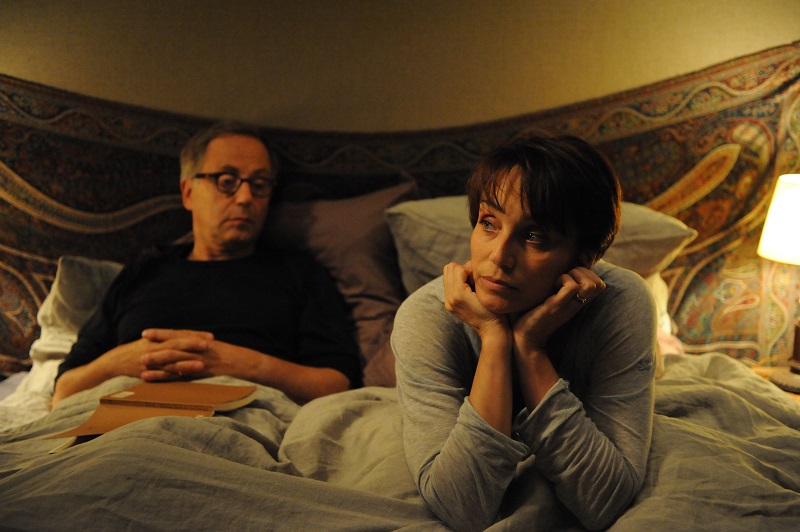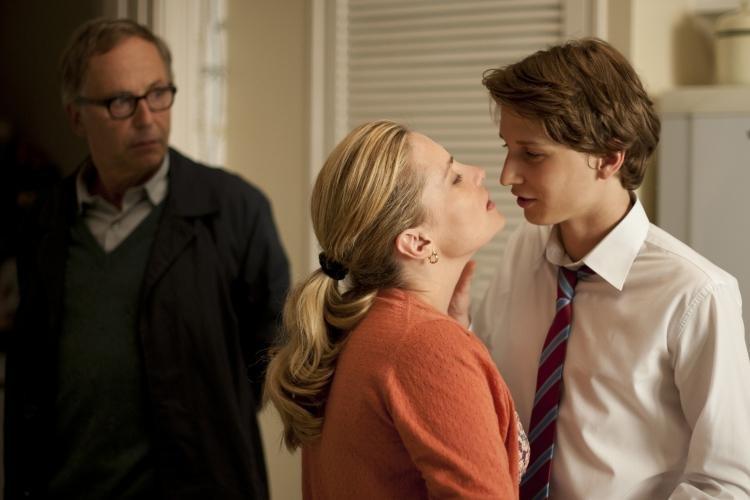There is an arresting moment towards the start of In the House when a character looks the camera – and by extension, the audience - directly in the eye. A warm trusting face and a slight squint hint at vulnerability (see clip below). His name is Rafa, and he is the best friend of Claude, who regularly visits Rafa's house after school to help him with his maths. But we soon learn that Claude’s furtive intention is to infiltrate an ideal suburban home as part of an observational writing assignment.
Among the piles of vacuous contributions from his classmates, Claude’s account of what he did on his weekend - however voyeuristic - catches the jaded eye of his literature teacher Germain (Fabrice Luchini), who reads it out to his wife Jeanne (Kristin Scott Thomas), only briefly questioning its ethical dubiety before encouraging his pupil to persevere with his literary stalking. Claude (Ernst Umhauer) starts submitting regular dispatches, noting the boredom of Rafa's lovely mother Esther (Emmanuelle Seigner), on whom he develops a crush, and the doltishness of his cocksure father, also called Rafa (Denis Ménochet).
'Why Rafa?' Watch a clip from In The House
Though himself a failed writer, Germain can recognise young talent, and is soon pedagogically leading his protégé through the byways of narrative realism, urging him to tweak, manipulate and embellish in the cause of believability. Jeanne, who owns a struggling gallery specialising in modish installations, is hooked too, even when she discovers she has been shoehorned into the action herself. “Can you explain what I’m doing in the story?” says a startled Scott Thomas (pictured below with Luchini) in one of the funniest lines of a film that overflows with pleasing, allusive wit about the mechanics of the storyteller's art. Among the jokes about Flaubert and Dostoevsky (and the fatuities of contemporary education), there are also lovely nods to Woody Allen, Pasolini and, climactically, to Rear Window.
 Usually when stage plays are rejigged for the cinema, the talk is of the bumpiness of the transition. Has the director contrived to open out the action, to remove the fourth wall and shuck off the conventions of theatrical artifice? It’s not quite like that with In The House. Adapted by François Ozon from The Boy in the Last Row by Spanish playwright Juan Mayorga, the film’s theatrical DNA has been skilfully retooled. As it progresses, it becomes clear that we are immersed in an examination of the complicit relationship between not only writer and reader, but also filmmaker and viewer. Hence the question invited by that puppyish look of trust on the face of Rafa (Bastien Ughetto). Graham Greene once famously said that the writer needs a splinter of ice in his heart. Ozon argues that perhaps the audience does too.
Usually when stage plays are rejigged for the cinema, the talk is of the bumpiness of the transition. Has the director contrived to open out the action, to remove the fourth wall and shuck off the conventions of theatrical artifice? It’s not quite like that with In The House. Adapted by François Ozon from The Boy in the Last Row by Spanish playwright Juan Mayorga, the film’s theatrical DNA has been skilfully retooled. As it progresses, it becomes clear that we are immersed in an examination of the complicit relationship between not only writer and reader, but also filmmaker and viewer. Hence the question invited by that puppyish look of trust on the face of Rafa (Bastien Ughetto). Graham Greene once famously said that the writer needs a splinter of ice in his heart. Ozon argues that perhaps the audience does too.
Interviewed this week on theartsdesk, the director explains how he co-opted the language of film to watch a writer at work (even though we never actually see Claude put pen to paper), and for the most part the tricksiness of the story-within-a-story device casts an intriguing spell as it strays into metatextual fantasy. As with any story, though, success must be measured at least partly in how much you have invested in the characters' emotional lives, and how eager you are to get to the last page. On that count, for all the delightful performances, Ozon's perming of perspectives grows a trifle alienating and In the House eventually finds itself stranded in its own hall of mirrors.













Add comment